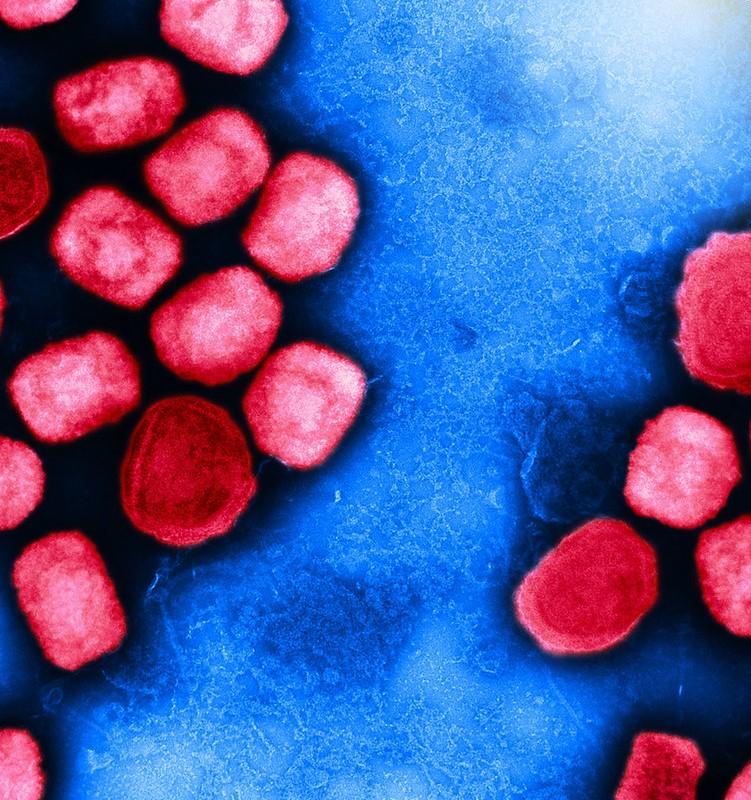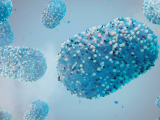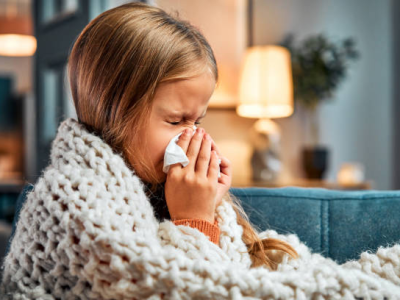A study today in Morbidity and Mortality Weekly Report shows multiple surface sites testing positive for monkeypox virus genetic material in a household of two people infected with monkeypox in Utah.
The two case-patients, who acquired the disease while traveling internationally, had isolated at home for 20 days before their home was entered for sampling by officials from the Utah Department of Health and Human Services (UDHHS). Agents collected samples from 30 objects in nine areas of the home.
Of the 30 specimens, 21 (70%) yielded positive real-time polymerase chain reaction (PCR) results, indicating the presence of monkeypox virus DNA. The swabbed areas included those from all three porous items (cloth furniture and blankets), 17 of 25 (68%) nonporous surfaces (handles and switches), and one of two mixed-surface types (chairs).
The investigators attempted to grow live virus in the lab from PCR-positive samples but noted, "No specimen yielded a positive viral culture result."
The contamination occurred despite the patients reporting showering once or twice each day, performing hand hygiene approximately 10 times daily, laundering bedding and clothing weekly, and performing routine household cleaning, such as mopping and daily use of a multi-surface spray on most high-contact surfaces, the authors said.
Though transmission is primarily driven by close, skin-to-skin contact, this study suggest fomite transmission (from inanimate objects) is possible.
"Persons living in or visiting the home of someone with monkeypox should follow appropriate precautions against indirect exposure and transmission by wearing a well-fitting mask, avoiding touching possibly contaminated surfaces, maintaining appropriate hand hygiene, avoiding sharing eating utensils, clothing, bedding, or towels, and following home disinfection recommendations," the authors concluded.
The US total now stands at 14,115 cases, after 598 more cases were confirmed yesterday.
EMA offers caution on intradermal vaccines
The European Medicines Agency (EMA) warned of a higher risk of local reactions (longer-lasting redness and thickening and discoloration of the skin) with intradermal fractional injections compared to subcutaneous injections.
The EMA said proper technique must be adhered to when administering monkeypox vaccine this way, "Taking into account all these considerations, national authorities may decide as a temporary measure to use Imvanex as an intradermal injection at a lower dose to protect at-risk individuals during the current monkeypox outbreak while supply of the vaccine remains limited," a statement read.
Imvanex, called Jynneos in the United States, is the Bavarian Nordic monkeypox vaccine now being used in multiple countries across the globe.
In Europe, 16,162 confirmed cases of monkeypox have been reported from 29 countries, with Spain reporting the most (5,792), followed by Germany (3,242), and France (2,749). According to the latest risk assessment from the European Centre for Disease Prevention and Control (ECDC), transmission is primarily among men who have sex with men ages 18 to 50.
"The likelihood of [monkeypox] spreading further in networks of people with multiple sexual partners in the EU/EEA is considered high and the likelihood of MPX spreading among the broader population is assessed as very low," the ECDC said.
CDC streamlines Tpoxx treatment
In a continued effort to cut down paperwork and red tape needed to access Tpoxx (tecovirimat), a monkeypox antiviral stored in the Strategic National Stockpile, the US Centers for Disease Control and Prevention (CDC) said yesterday that patient diaries and photographs of lesions were now optional.
Now only four forms are required, and all paperwork can be completed after a patient begins treatment. Earlier in the outbreak physicians were saying that 3 to 4 hours of paperwork per patient was required to obtain the drug.
In vaccine news, Bavarian Nordic announced it has signed up Michigan-based Grand River Aseptic to package Jynneos vaccine beginning later this year.
Finally today, data from New York City show racial disparities among monkeypox vaccine recipients, especially in the Black community. Black vaccine recipients have gotten only 12% of doses yet make up 31% of those eligible for vaccination.
NYC Health said it's adding mobile vaccination units and increased resources in community clinics to address this issue.






















